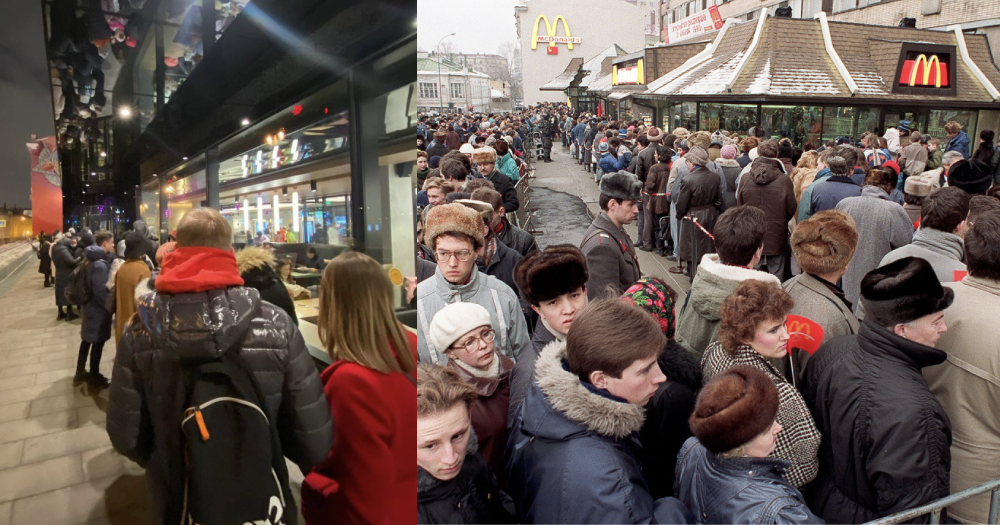Follow us on Telegram for the latest updates: https://t.me/mothershipsg
McDonald's has temporarily pulled out of Russia amid growing global backlash against the country for its invasion of Ukraine.
Following the American fast food conglomerate's announcement, other Western brands, such as Starbucks, Coca-Cola and PepsiCo, have followed suit.
Several more have also made known their plans to limit their operations in the country, such as Apple, Google, Facebook, Ikea, Nike, H&M, Toyota, Volkswagen and Mercedes-Benz.
But the announcement by McDonald's prompted Russians to flock to its outlets across the country, which number at around 850, forming long queues outside the famed golden arches for one last happy meal before the stores shutter -- potentially for a long time.
Supersize me ! There's a long queue forming in Moscow outside the huge and historic #McDonalds on Pushkin Square after the US fastfood giant announced it was closing in Russia. pic.twitter.com/C8mZCzFhpc
— Jason Corcoran (@jason_corcoran) March 8, 2022
Many drove to their nearest outlet, causing traffic to stall slightly at certain locations.
🇷🇺|Largas filas en las tiendas de McDonalds en Moscú después de que anunciaran que dejarán de operar en Rusia. https://t.co/344VRRVYWO
— Alerta News 🚨 (@Alerta_News_) March 8, 2022
Long queues when McDonald's first opened in Russia
The long queues have drawn comparisons to the snaking queue that formed outside the Soviet Union's first McDonald's outlet when it opened on Jan. 31, 1990, at Pushkin Square in central Moscow.
The largest outlet in the world at the time, it brought a splash of colour to the city landscape which was dominated by dull, greyish colours.
In last couple couple of hours Coke, Mcdonalds and Starbucks shutdown it's business in Russia.
— riiiiiiiiiiiiiiiiiiiiiiiiiiiiiiiiiiiis (@riiiiiiiiss) March 8, 2022
That's the picture from 1990's. It was the opening with crazy queues.
Today was the last day.
End of an era. pic.twitter.com/Pc3lV2t3dT
Former British Defence Secretary Denis Healey had once remarked that the queue outside the new McDonald's was even longer than at Lenin's tomb, according to Financial Times (FT).
The opening was highly anticipated, with 5,000 people waiting outside the restaurant to have a taste of an American burger.
The atmosphere was exuberant and filled with carnival-like vibes, as musicians performed and mascots danced around.
The first #McDonald's opened in Moscow 32 years ago, a symbol of capitalism that over time introduced classics like the The Western Gourmet Burger and McShrimp. Today, the company says it is closing some 850 restaurants in the country, at least temporarily. End of an era? pic.twitter.com/qRamjDxoPf
— Isik Mater🌻 (@isik5) March 8, 2022
The popularity of the fast food outlet among ordinary Russians was a sign of their embrace of American pop culture, food and fashion, of which blue jeans became the symbol of political dissent and freedom through Western capitalism.
American clothing company Levi's has announced that it's suspending its operations in Russia as well.
https://twitter.com/Gabdulhakov_R/status/1501292395958358022
A man waiting in line for one last McDonald's meal, Dmitry Grigoryev, remarked to The Guardian: "My dad once told me how he waited in a long line when McDonald's opened when he was young. And now I ended up also queuing, but for a very different reason. History can be funny."
https://twitter.com/Dylan_johnston1/status/1501263817170468864
To Russian history professor Vladislav Zubok, the closure of the iconic fast food chain in present-day Russia marks the end of an era, FT reported.
In 1990 I was in the queue when McDonald's opened its 1st restaurant in Moscow: when iron curtains were crumbling & Russia was embracing the West. Today McDonald's announced it is temporarily closing its 850 restaurants in Russia. Hugely symbolic.
— Steve Rosenberg (@BBCSteveR) March 8, 2022
However, he doesn't think the "cultural decline" that follows the withdrawal of Western companies will be as impactful as the cultural changes that they brought to Russia decades ago.
Experts also don't think that the withdrawal of Western companies, nor financial sanctions, will coerce Russian president Vladimir Putin from stopping the war against Ukraine, according to ABC News.
Nevertheless, the impact of sanctions and similar moves that seek to isolate Russia from the global economy, is likely to be felt by regular people.
Regardless of their opinion towards the war their leader has waged, they probably "do not yet understand just how much the sanctions will affect them and their daily lives in the coming months," lifestyle commentator Katya Fedorova told The Guardian.
Follow and listen to our podcast here
Top image adapted via Twitter
If you like what you read, follow us on Facebook, Instagram, Twitter and Telegram to get the latest updates.
